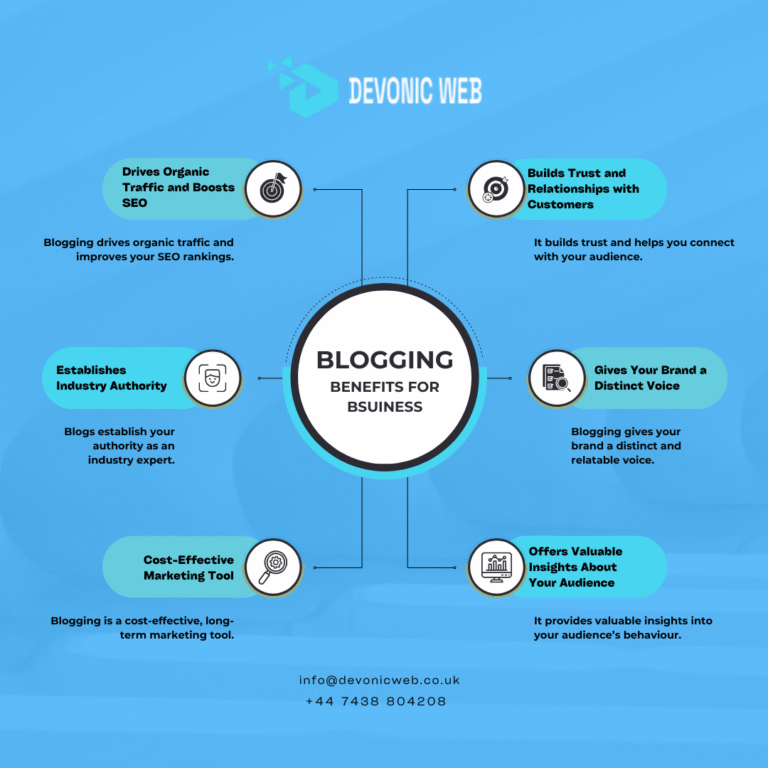7 Benefits of Blogging for Business and How to Get Started

Blogging has evolved into one of the most effective tools for business growth in the digital age. While some individuals blog as a personal outlet, business blogging serves a more strategic purpose—attracting potential customers, enhancing search visibility, and building authority in your industry.
If you own a business and have not yet started a blog, you’re missing out on a long-term digital marketing investment. In this article, we’ll take you through 7 advantages of blogging for business and how to start generating meaningful content that converts.
1 – Drives Organic Traffic and Improves SEO
One of the most significant advantages of blogging is its role in search engine optimisation (SEO). Every blog post you write provides your site with another chance at appearing within search engine results.
By using proper keywords and targeting search intent, blogs assist your site in appearing higher on Google. Search engines favour informative, high-quality content that provides value to users, particularly following Google’s “Helpful Content” update.
Blogging also provides the opportunity for internal linking, which directs users to your main landing pages, and aids social media sharing by offering interesting content that you can repurpose on different platforms.
2 – Establishes Trust and Relationships with Customers
Blogging facilitates humanising your brand. By regularly publishing valuable content, you demonstrate to potential customers that you comprehend their requirements and issues.
Informative blogs provide a platform for businesses to engage on a higher level with their audience, either by responding to frequently asked questions or offering solutions to everyday problems. Shares and comments are opportunities to engage and interact, solidifying your position as a trusted brand.
3 – Sets Industry Authority
Posting regular, thought-provoking blog articles makes your company a thought leader within your niche. Whether you’re providing tips, sharing expertise, or writing about trends in the market, blogs establish you as a credible authority over time.
A credible blog not only draws customers but also peers within your industry, partners, and even the media. Once you become an authority on knowledge, people are more likely to come back to your website and recommend others.
4 – Provides Your Brand with a Unique Voice
While on your service pages or homepage, you can be more conversational and flexible in tone with your blog. It’s where you can share company news, discuss industry trends, and showcase your brand’s personality.
This differentiation provides your business with a voice, making it one that is heard above the rest in a noisy market. Readers start identifying with your tone and values along with your expertise, which makes them loyal to your brand.
5 – Provides Excellent Insights Into Your Audience
One of the underrated advantages of blogging is that it produces data. Blog analytics tell you what content works best, what subjects most appeal to your audience, and how users interact with your site.
Monitoring metrics such as time on page, bounce rate, and conversions enables you to make informed choices about future content marketing and strategy.
6 – Affordable Marketing Tool
Starting a blog is one of the most affordable digital marketing strategies available. Compared to paid ads, a blog requires minimal investment but can continue to generate leads and traffic long after it’s published.
A well-optimised blog post becomes a permanent asset on your website—one that works around the clock to drive awareness, traffic, and trust.
7 – Proven to Deliver Results
Businesses that blog get 97% more backlinks to their sites than non-blogs, according to HubSpot. This not only increases domain authority but also enhances search visibility.
Popular blogs become hub sites for backlinks, shares, and mentions throughout the web, all of which affect your online reputation and rankings.
How to Begin a Business Blog
Starting a business blog begins with a well-defined content strategy. This involves:
- Determining your target audience
- Determining the objectives of your blog (SEO, traffic, education, conversions)
- Conducting keyword research and popular topics
- Having a regular publishing schedule
Before you publish, look at competitors within your niche. What are they writing about? What voice are they speaking? Try to produce content that’s not only different but also improved—more valuable, more informative, or more entertaining.
Some blogging must-haves include:
Write high-quality content: Strive for depth, clarity, and relevance in every blog post.
- Respond to searcher queries: Organise content around actual questions users might search for in Google.
- Optimise for SEO: Insert keywords naturally into headings, subheadings, and body copy without excess repetition.
- Utilise internal links: Link to your products, services, and other corresponding blog content.
- Share across platforms: Leverage social media and newsletters to expand reach.
Need Help Creating Your Blog?
If the thought of starting a blog is intimidating, we’re here to assist. Here at DevonicWeb, we provide complete blog management—from content planning and keyword research to SEO writing, design, and publishing.
Get in touch with us today to see how we can help your business thrive through high-impact blogging.
